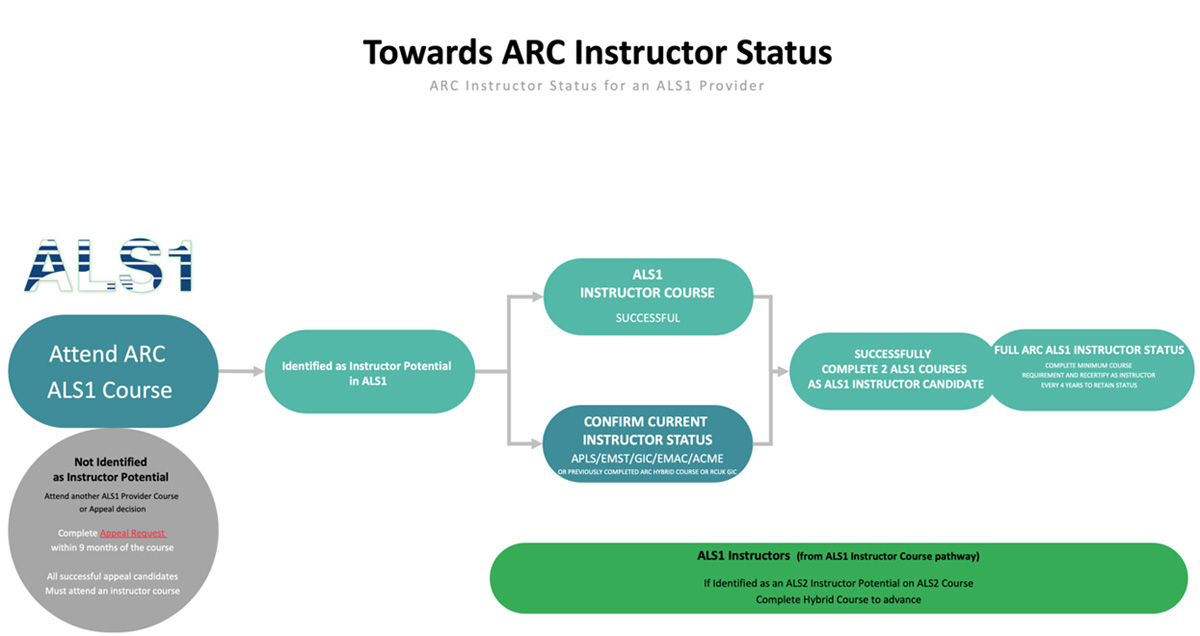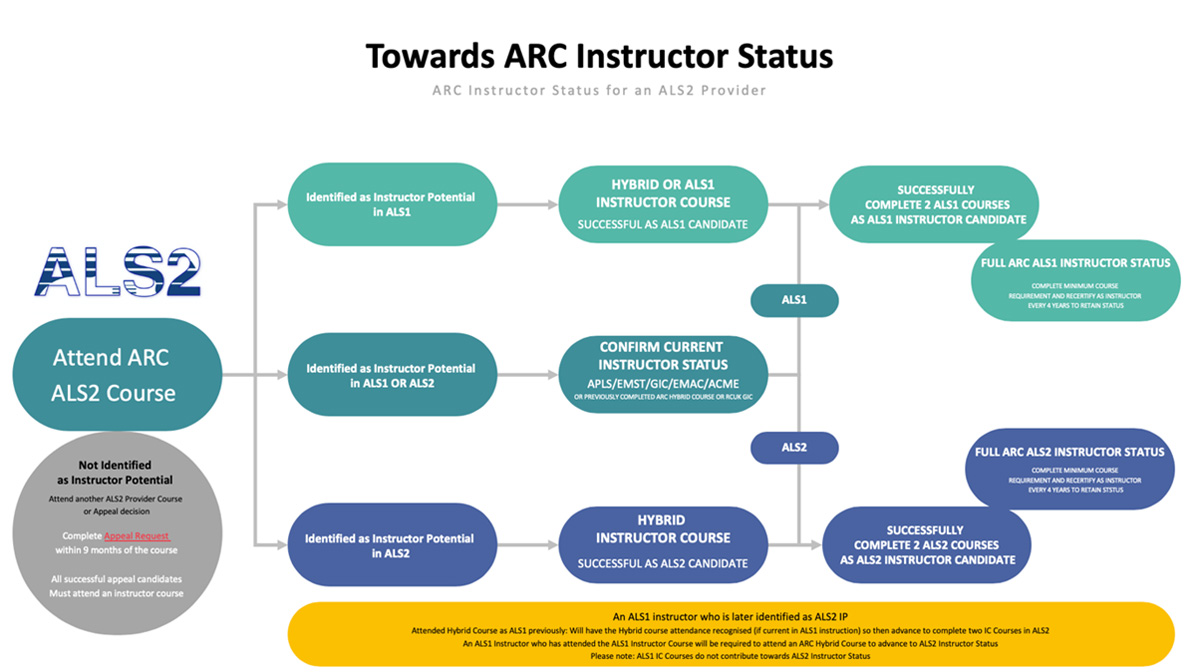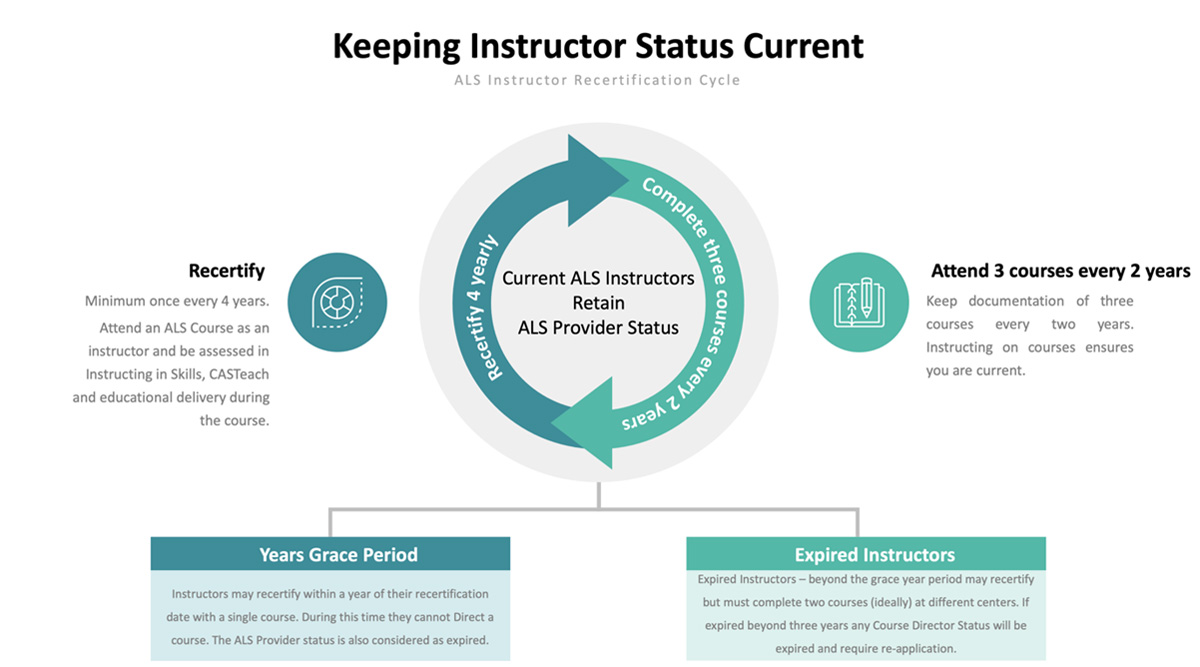ARC ALS Instructors
ARC ALS Instructors / ARC ALS Course Directors / Instructor Candidates
ARC ALS Certification Expiry has been extended since the pandemic outbreak. The result is that all expiry dates from 1st March 2020 are still being offered an extension to recertify or complete IC courses.
ARC ALS Instructors
- Instructors who have certification due to expire from 1 March 2020, including those in the grace year, are still eligible to recertify on the one course and we advise taking the opportunity to recertify as soon as possible.
ARC ALS Course Directors
- Course Directors normally cannot direct a course in the grace period. If this grace period started after 1 March 2020, we have extended the expiry for those Directors permitting them to continue as normal.
Instructor Candidates
- Those with ALS certification due to expire from March 2020 (4 years since provider course) yet to complete IC placements will be able to complete IC placements during the extension of expiry.
Expiry requests for instructors or ICs on or until 29th of February 2020 will remain unchanged.
We are always looking for enthusiastic, experienced clinicians to deliver ALS education as ARC Instructors. In order to ensure the standards of the courses are maintained, the path to ARC Instructor status is a heavily prescribed. During ALS courses all candidates are continuously evaluated for their skills, knowledge and qualities that contribute towards a good instructor. Outstanding candidates on the ALS courses are identified as having instructor potential by the faculty on that course and invited to become instructors themselves and given access to an OPT In form at the end of the course. (Click to enlarge the images below)


The Path to ARC Instructor Status
Decisions made during the course regarding the Instructor Potential (IP) consideration are a result of the whole faculty. To achieve successful nomination for IP status during the course the candidate must:
- Be nominated and seconded by faculty members on the course
- Achieve satisfactory rating in assessment of
- Formative assessments (ALS2)
- Continuous assessment of technical and non-technical skills (ALS1 and ALS2)
- In order to be successfully put forward for ALS2/ALS Instructor Potential (IP), the candidate must score a minimum total of 25, (ALS1/ILS IP must score minimum of 17) and must score greater than 83% in their MCQ (ALS2 course).
- Any score of ‘Not Achieved’ excludes the candidate from being selected.
- Please note the clinical and non-technical skills are continuously assessed throughout the whole course and not just within the specific skill station or when team leading. Scores may adjust over the course with exposure and practice from the initial skill station and further observation from all faculty members
- All criteria are assessed over duration of the course and not solely within the specific skills workshop for example. The main advantages of continuous assessment are that both candidates and faculty obtain feedback, which can then be used to improve learning. The final result is based on evidence gathered over the span of the whole course. For details on the IP assessment please click here. IP Appraisal for ALS1/ALS2
Those identified as IP then attend an Instructor Course, unless they have already completed a recognised instructor course previously. (Please note that AHA, ACLS and ACCCN Instructor courses are not recognised). In the event the candidate has already attended an Instructor Course recognised by the ARC (e.g. EMST/GIC/NZRC etc) the ARC may recognise this prior learning and these candidates move straight to Instructor Candidate (IC) status. Please complete the Current Instructor Form. This information will then be used to confirm the credentials.
Instructor Potential nominated from ALS2 Courses: Attend the Hybrid Instructor Course. On the Hybrid Course Instructor Potential (IP) nominees for ALS1 and ALS2 attend the same course. In the Hybrid course it is assumed the base clinical knowledge level is that of an ALS2 Provider. If attending the Hybrid Course as an ALS1 IP and later identified as an ALS2 IP there is no need to reattend the instructor course as the prior course is recognised. If nominated as an ALS1 IP the candidate may choose to attend the ALS1 Instructor Course as below.
Instructor Potential nominated from ALS1 Courses: IP candidates nominated from ALS1 provider courses must attend the ALS1 specific Instructor Course. ALS1 IP candidates from ALS2 Courses may choose to attend the ALS1 Instructor Course. Many candidates who wish to focus on the ALS1 course as an Instructor found this pathway ideal for their needs. If later identified as an ALS2 IP (on an ALS2 provider course) there is a requirement for the ALS1 Instructor who has followed this specific pathway to attend the Hybrid Instructor Course. Those candidates who have undergone this pathway to ALS2 instructor status have found attending the Hybrid course better prepared them for ALS2 instructing.
The Instructor Courses use contemporary theories of adult education in ALS and assists instructor development adding to the skills and knowledge already demonstrated by the potential instructor. Courses are facilitated in all states and territories.
After successfully completing the Instructor Course candidates must then attend two courses as an Instructor Candidate (IC), where experienced instructors, mentor and evaluate them in before being registered as full instructors, provided the faculty is satisfied they have met the required standard.
As no process is completely perfect, an appeal is possible for those candidates who feel they would make good instructors but were not identified on the original course. To appeal a decision to become an IP you will need to complete the Appeal Form and forward to the National Course Coordinator (education@resus.org.au). This process must be commenced no later than 9 months following the ALS Course completion. Appeals are possible for those not identified as all or those identified as ALS1 IP and wish consideration for ALS2 IP status.
ARC Full Instructors

The need for healthcare professionals to record professional, academic and other related activity has for some time been a requirement of continuing professional and personal development. Following a review of the instructor re-certification process, the Australian Resuscitation Council has adapted from the Resuscitation Council (UK) professional development record (PDR) that will enable you to collect, comment upon and evaluate your ongoing contribution to this specialist area of healthcare education. This is not a replacement of current systems of documentation but may be used as an adjunct to current logbooks, portfolios and other record keeping. The PDR may prove of value and assist in times of professional college development requirements and national registration requirements. Healthcare professionals all take responsibility for their own self-development and acknowledging how this contributes to life long learning. It is an essential component of continuing professional development. The PDR is a critical account of your Instructor activity, rather than an annotated contents list. This provides you with the opportunity to place into context the work you undertake as an Instructor and outline where learning/development has taken place. It is advised that Section 2 of the PDR is completed as a minimum. The PDR outline will be the recommended tool for recording the following:
- Number of courses taught
- Details of teaching commitments on each course
- Written feedback/comments relating to the teaching experience
- Reflective writing on the teaching experience
The collection of such evidence of development will enhance any review processes for Instructors when re-certifying or in application for Course Director status.
ARC Instructors should teach on a minimum of three courses at the level they are registered as an instructor every 2 years. These courses can be full or modular courses where active teaching has been over 50% of those courses. Non-teaching Course Directors may need to seek opportunities to engage in educational delivery to meet these requirements if only undertaking the role of Course Director. (Course results include faculty listings and identify the days present indicating if more than 75% of that time is spent Instructing).
Recommended minimum number of courses every 2 years to recertify as an:
ALS2 Instructor:
- 3 ALS2 Courses
- 2 ALS2 Courses and Multiple ALS1 Courses
- 2 ALS2 courses and 2 Hybrid Instructor Courses
ALS1 Instructor:
- 3 ALS1 Courses
ALS2 instructor converting to ALS1 status
- 2 ALS1 and 1 ALS2 Courses
- 3 ALS1 Courses (Same as ALS1 Instructor)
This is not always achievable as a result of limited centres in the local area or for other reasons and consideration (when one or two courses only have been completed) should be sought from the ARC Course Coordinator education@resus.org.au. This may result in the requirement to undertake two recertification courses over a period of time. Upon submission please include dates of courses and centres in the last 2 to 4 years and all cases will be considered on an individual basis.
When an ALS2 Instructor wishes to only undertake ALS1 Instructing in the future they should inform the ARC of this decision info@resus.org.au and make a request the records reflect this. Upon recertification any previous ALS2 courses in the last two years will be considered. If at a later date they wish to return to ALS2 Instructing they will need to undertake the expired instructor pathway of two courses as an Instructor Candidate and would be recommended to observe an ALS2 Course prior to commencing.
ALS1 Instructor Identified as an ALS2 IP
When an ALS1 Instructor who has attended the ARC HYBRID Instructor Course has attended an ARC ALS2 Course and been identified as Instructor Potential for ALS2 they move to Instructor Candidate (IC) status. There is no need to repeat the instructor course. There is a requirement to complete two IC Courses being assessed in Skill Station Teaching and CASTeach delivery and can not be forwarded to Full Instructor status following a single course.
If the ALS1 Instructor has completed the ARC one day ALS1 Instructor Course and been identified as an ALS2 IP, they must complete an ARC HYBRID Instructor Course.
Expired Instructors
The ARC Instructor Certification is four years in duration. Every four years or sooner all Instructors must recertify on a course being assessed in educational delivery of a Skill Station and CASTeaching. Informal feedback is also delivered on other sessions by other faculty. Once the certification has expired the ARC permit a years ‘grace’ in order for the Instructor to recertify.
- If within the certification or years ‘grace’ period the Instructor may recertify on a single ARC course.
- If beyond the years ‘grace’ period the Instructor must undertake two full ARC courses to recertify. (ALS1 courses will not contribute towards ALS2 recertification).
Expired Instructors may not act in the role as Course Directors. If the Instructor has gone beyond the four years of certification and is in the ‘grace’ period they are expired and are not eligible to undertake the role as a Course Director. Expired Instructors may not apply for Course Director Status.
Instructor (Code of) Conduct
All who instruct, or otherwise assist, on Courses held under the auspices of the Australian Resuscitation Council:
- Have a full understanding that individual (and organisational) accreditation and continuing accreditation is dependent on observing the regulations as well as completing the necessary requirements for re-certification.
- Ensure that courses approved by the Australian Resuscitation Council are run in accordance with its regulations currently in force using the manuals, slides and other materials so as to ensure that consistent standards of knowledge, skills and consistent assessment standards are achieved. When concerns are identified the first point of contact is the Course Director. In the event this does not lead to a satisfactory resolution any Instructor or faculty member may contact the Australian Resuscitation Council directly.
- Behave, at all times, while participating in courses, or social events related to the courses which are run under the auspices of the Australian Resuscitation Council, in a responsible manner and observe any applicable professional codes of conduct.
- Co-operate with other instructors, educators and administrators (of the faculty and Australian Resuscitation Council) and recognise and respect their individual contributions.
- Avoid any abuse of their position.
Any conduct that brings the Australian Resuscitation Council into disrepute, either through instructional or professional error, or misconduct (whether amounting to gross misconduct or otherwise), may result in the loss of accreditation. Any relevant employer of the instructor will be notified of this loss of accreditation.
Likewise, conduct which results in the loss of professional or other accreditation from will automatically result in the loss of accreditation. A right of appeal, to the Australian Resuscitation ALS Sub-committee is possible. The decision of this committee is however final.
An ALS instructor must declare any actual or potentially perceived conflict of interest. This is in relation to all potential conflicts but particularly when relating to the assessment of candidate(s) with which the Instructor may have a personal or professional relationship.
Instructor relationships with candidates should be disclosed to the Course Director or whole faculty as appropriate. This can be achieved at the commencement of the course.
Current ARC Instructors are welcome to include Instructor Status into items such as résumés, signature blocks or other correspondence when appropriate. Views and opinions expressed by Individuals identifying themselves, as ARC Instructors do not necessarily reflect the official policy or position of the Australian Resuscitation Council.
